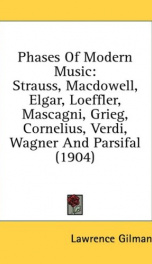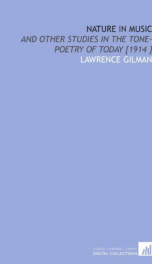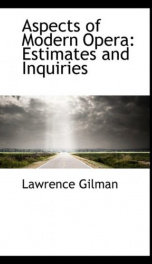Edward MacDowell

Purchase of this book includes free trial access to www.million-books.com where you can read more than a million books for free. This is an OCR edition with typos. Excerpt from book: THE MUSIC-MAKER CHAPTER III HIS ART AND ITS METHODS Among those music-makers of to-day who are both pre-eminent and representative the note of sincere romance is infrequently sounded. The fact must be obvious to the most casual observer of musical art in its contemporary development. The significant work of the most considerable musicians of our time of Strauss, Debussy, Loeffler, dTndy has few essentially romantic characteristics. It is necessary to distinguish between that fatuous Romanticism of which Mr. Ernest Newman has given an unequalled definition: the Romanticism which expended itself in the fabrication of a pasteboard world of "gloomy forests, enchanted castles, impossible maidens, and the obsolete profession of magic," and that other and imperishable Spirit of Romance whose infrequent embodiment in modern music I have remarked. That is a romance in no wise divorced from reality is, in fact, but reality diviningly perceived; if it uses the old Romanti- cistic properties, it uses them not because of any inherent validity which they possess, but because they may at times be made to serve as symbols. It deals in a truth that is no less authentic because it is conveyed in terms of a beauty that may often be in the last degree incalculable and aerial. It is to its persistent embodiment of this valid spirit of romance that MacDowell's work owes its final and particular distinction. I know of no composer who has displayed a like sensitiveness to the finer stuff of romance. He has chosen more than occasionally to employ, in the accomplishment of his purposes, what seems at first to be precisely the magical apparatus so necessary to the older Romanticism. Dryads and elves are his intimate companions, and he dwells at times under fairy boughs and in enchanted woo... --This text refers to an alternate Paperback edition.
Info about the book
Author:
Series:
Unknown
ISBN:
3842474997
Rating:
4/5 (4)Your rating:
0/5
Languge:
English
Users who have this book
Users who want this book
What readers are saying
What do you think? Write your own comment on this book!
write a commentif you like Edward MacDowell try:
Do you want to exchange books? It’s EASY!
Get registered and find other users who want to give their favourite books to good hands!




